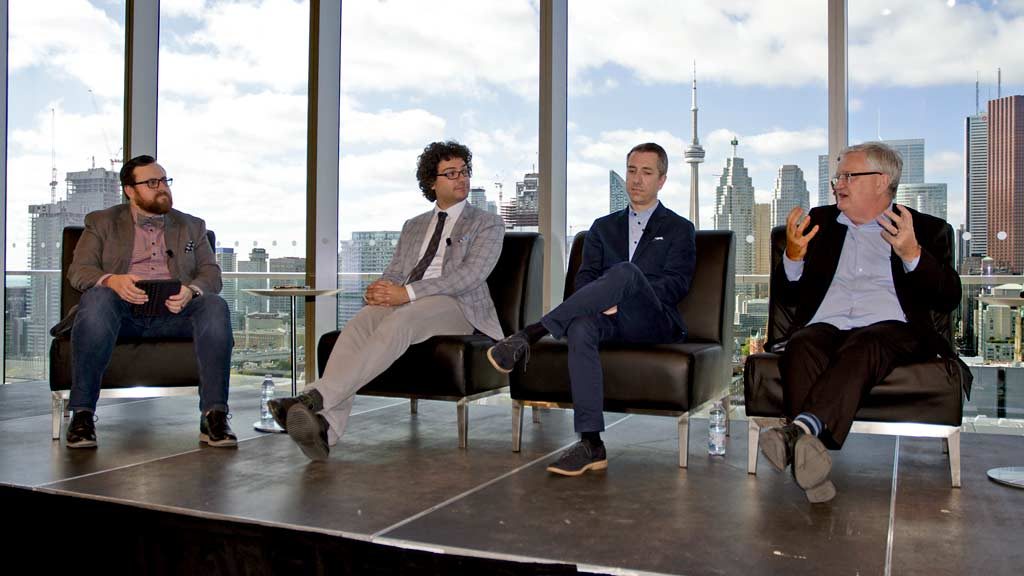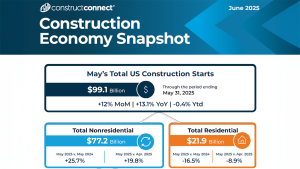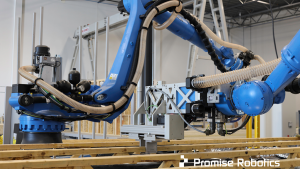A panel of experts discussed how to bridge the gap between the experience of the past and the technology of today at a recent construction industry forecasts conference.
“At the end of the day, we’ve got systems in place that are set up for how we work in the past not in the future,” said Gary Webster, KPMG’s national Canadian infrastructure practice leader and global head of capital projects.
“We’ve got people with a lot of experience that are used to doing it a certain way. We will change, there is definitely a need coming but there is a lot more that needs to be done.”
The panel on how technology is disrupting construction was part of the annual CanaData conference hosted by ConstructConnect Oct. 18 in Toronto.
“On the education side, I don’t think it’s a big change to start to look at how to become more innovative and creative while sustaining the ways of our industry today,” said Webster.
“The best ideas that I’ve seen actually came out of the workplace. There is a generation that is starting to be more innovative and looking at how can we capture some of the experience of the past into the systems we’ve got today.”
He added, some of the larger companies that invest heavily in research and development have already started to collaborate with each other.
“If we don’t wake up and start working with others, we will be taken over (by tech companies),” he said, adding tech companies today want to work with construction companies to come up with solutions for the industry.
“As an industry we’re our own worst enemy at times. Until we are all start speaking with one voice for a strategy for the future, whatever it is, and educating the people who need to be educated, we are going to continue down this path.”
Moderator Kris Lengieza, director of business development at Procore Technologies, said three years ago very few construction firms had a chief technology officer or a data analyst and now all the top firms are recruiting data analysts from ivy league schools.
The construction industry still needs to advocate to implement these technologies at a government level and at an educational level,
— Yuri Batzis
Pomerleau
“They are taking people from outside the industry to look at data to drive decisions rather than trying to confirm assumptions based on what they already have,” said Lengieza.
“We need to take the tech talent that we have available, pair it with the institutional knowledge that we have on site, put those two things together in a room and then it comes to communication and collaboration. Can they actually listen and learn and build something that matters.”
Mike Hainsworth, executive producer of Futurithmic and co-host of the Geeks and Beats podcast, said education is key, starting with those entering the industry.
“You need a chief technology officer, you need a chief digital officer but at the same time you need to bring in fresh new blood that understands these technologies because they haven’t really been teaching this in schools and in a lot of these cases they are teaching themselves,” said Hainsworth.
While new graduates will have a high level of comfort with the digital world they still need to be educated on technology used by the industry, said Yuri Bartzis, BIM/VDC regional manager at Pomerleau.
“When I went through school, using BIM (Building Information Modeling) and 3D models for construction wasn’t even taught,” said Bartzis. “The construction industry still needs to advocate to implement these technologies at a government level and at an educational level.”
The panel agreed technology such as BIM and modular construction make the planning, design and construction phases of a project more efficient. Augmented reality can also help train people on equipment much quicker and will eventually allow operators to control machines from remote locations.
Hainsworth said it’s important to use the technology that is appropriate for the application.
“Just because there is this particular technology doesn’t mean it has to be applied in every instance,” he noted.
“We have to think about these technologies not in isolation and that the rest of the world around you is going to come to expect you to use a certain level of this technology and if you aren’t seen to be doing so you are seen to be a laggard and if you are seen to be a laggard you’re not somebody they’re going to want to do business with.”
In the future, technology may fundamentally change the way contractors operate.
“Will a general contractor even exist as they do today — I don’t know?” asked Webster. “It could still exist but it’s going to be a different role. I tell construction companies you’ve got to wake up guys or you won’t even be here in 10 years.”
Follow Angela Gismondi on Twitter @DCN_Angela.











Recent Comments